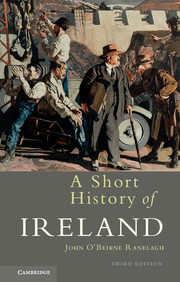Book contents
- Frontmatter
- Contents
- List of figures
- Preface to the first edition
- Preface to the second edition
- Preface to the updated edition
- Preface to the third edition
- Map of Ireland: The Pale and the Irish plantations
- Chapter 1 Beginnings
- Chapter 2 Ascendancy
- Chapter 3 Union
- Chapter 4 Home rule?
- Chapter 5 Rising
- Chapter 6 South
- Chapter 7 North
- Chapter 8 Another country
- Appendix Timeline of Irish history
- Select bibliography
- Index
- References
Chapter 3 - Union
Published online by Cambridge University Press: 05 November 2012
- Frontmatter
- Contents
- List of figures
- Preface to the first edition
- Preface to the second edition
- Preface to the updated edition
- Preface to the third edition
- Map of Ireland: The Pale and the Irish plantations
- Chapter 1 Beginnings
- Chapter 2 Ascendancy
- Chapter 3 Union
- Chapter 4 Home rule?
- Chapter 5 Rising
- Chapter 6 South
- Chapter 7 North
- Chapter 8 Another country
- Appendix Timeline of Irish history
- Select bibliography
- Index
- References
Summary
The Penal Laws had helped make a natural connection between Catholicism and reform in Ireland. In 1791 a Catholic Committee, first formed in 1759, was revived to petition for relief and enjoyed some success, notably with the Catholic Convention of 1792 which Wolfe Tone had organised and which had played an important part in securing the Catholic Relief Act. The Catholics who took part in the Convention and who formed the Catholic Committee were, for the most part, substantial Cork and Dublin merchants who shared many of the Ascendancy’s aspirations and commercial objectives. The great majority of Catholic Irishmen (in common with the mass of people everywhere except in the new United States of America) were not represented anywhere. And while the Ascendancy ruling class was connected to the governing classes in Britain, ordinary people in both countries had little contact with one another before the Industrial Revolution attracted Irish labourers to British cities. Bishop Berkeley, Arthur Young and Jonathan Swift were actually making clear to their English readers an Irish way and condition of life quite unlike that which obtained in England. The Catholicism of Ireland was simply the highlight of a separate cultural (and by 1800 an increasingly separate national) identity.
The Stuart, Cromwellian and Williamite plantations of the seventeenth century had crushed Gaelic culture into pretty much the property of the peasantry alone, with only a few old Gaelic families (for example the O’Byrnes of Wicklow and the O’Connells of Kerry) managing to survive with some land, maintaining Gaelic cultural and social habits well into the eighteenth century. Hedge schools – illegal roadside gatherings (laws passed in 1696 and 1710 prohibited Catholic teachers and education, and sending children abroad) – grew up during the eighteenth century, with priests and the successors to the ancient Gaelic brehons and poets teaching peasant children, keeping alive their language, the history and stories of Gaelic Ireland, and even Latin and Greek. John O’Hagan, a distinguished nineteenth-century Dublin barrister and writer, gave a succinct pen portrait of the schools:
Still crouching ’neath the sheltering hedge,
Or stretched on mountain fern,
The teacher and his pupils met feloniously to learn.
A strong communal spirit took root: meithaels, a voluntary system whereby peasants assembled to perform the intensive farmwork on one holding after another, began to develop during the seventeenth century (and lasted into the twentieth century in the west of Ireland).
- Type
- Chapter
- Information
- A Short History of Ireland , pp. 97 - 144Publisher: Cambridge University PressPrint publication year: 2012



